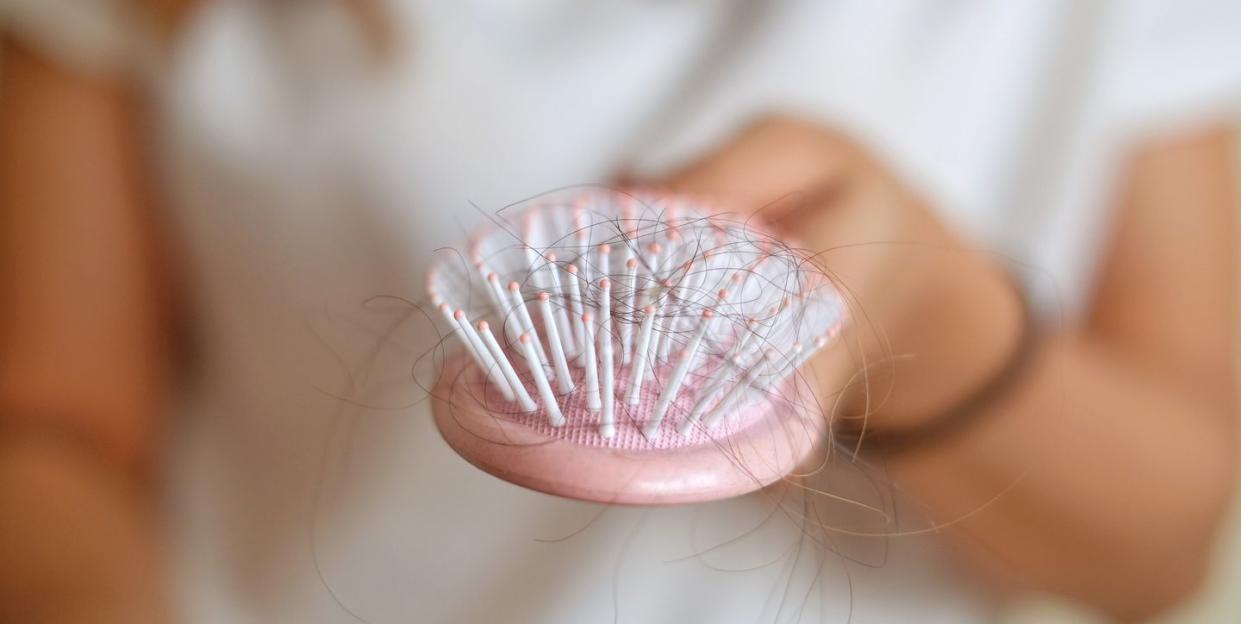Here’s Why Some People Who Had COVID-19 Are Now Dealing With Hair Loss

Reports keep surfacing of people struggling with a variety of side effects after being diagnosed with COVID-19. Some have a lingering cough, others have developed heart problems, and some feel completely fine. But there’s another issue some COVID-19 survivors are now reporting: hair loss.
Several members of Survivor Corps, the Facebook support group for people who have had COVID-19, recently opened up about dealing with hair loss months after recovering from the virus. “I got real sick with COVID in April. Thank God I recovered but now I’m worried about the lasting after effects,” one wrote. “My hair has been falling out way too much and I’m too scared to brush it.”
“Lots of hair loss. I got sick the last week of March. It’s slowing down a little,” someone else wrote. “I’ve always had thick enough hair, but now when it’s a ponytail it’s like half of what it was before,” another said. “Same thing happened to me,” a commenter chimed in.
While the Centers for Disease Control and Prevention (CDC) has information on when it’s OK to end home isolation after having COVID-19, it doesn’t address the lasting effects a person might experience.
However, a research letter published in JAMA in early July analyzed data from 143 patients who had COVID-19 and found that 44% said they had a “worsened quality of life.” People reported suffering from lingering symptoms like fatigue, shortness of breath, joint pain, and chest pain, but there was no mention of hair loss.
Still, experts aren’t shocked that COVID-19 has been linked to sudden shedding. “Hair loss is a well-described phenomenon after any kind of physiological stress on the body,” says infectious disease expert Amesh A. Adalja, M.D., senior scholar at the Johns Hopkins Center for Health Security.
Why might COVID-19 lead to hair loss?
“COVID-19 causes a lot of stress on the system,” explains says Gary Goldenberg, M.D., an assistant clinical professor of dermatology at the Icahn School of Medicine at Mount Sinai in New York City. “When the body is stressed, it channels blood flow and nutrients away from hair follicles.”
As a result, the hair follicles die and start to shed. There’s a name for this process: telogen effluvium. It’s normal to shed up to 100 hairs a day, but when you lose more than that, it falls into the category of telogen effluvium, according to the American Academy of Dermatology (AAD).
Telogen effluvium isn’t unique to COVID-19, though. It can also be caused by the following, according to the AAD:
Weight loss
Pregnancy
Extreme stress
A high fever
Surgery
Illness
Finishing birth control pills
Dr. Goldenberg says he “commonly” sees telogen effluvium “after any type of severe illness,” and most people notice the hair shedding a few months after the stressful event.
Can hair grow back after an intense illness?
It should. The shedding usually peaks about four months after the event that caused it, the AAD says. Over time, it slows down. Within six to nine months, your hair should go back to its normal fullness.
But Dr. Goldenberg says it’s possible for the hair loss to become chronic “with periods of shedding and regrowth.” It’s unclear at this point if that will happen with COVID-induced hair loss.
While telogen effluvium will often just run its course, it’s possible to take supplements geared at hair health (like these) to help jumpstart your regrowth, Dr. Goldenberg says. You can also talk to your dermatologist about possible treatment options, like platelet rich plasma therapy, which involves injecting a concentration of your platelets (small, colorless cell fragments in your blood) into your scalp to try to stimulate hair growth.
Keep in mind that this hair loss won’t last forever, and likely won’t get as bad as you think. “Usually, it’s self-limiting and doesn’t affect all of the hair,” Dr. Adalja says.
Support from readers like you helps us do our best work. Go here to subscribe to Prevention and get 12 FREE gifts. And sign up for our FREE newsletter here for daily health, nutrition, and fitness advice.
You Might Also Like


